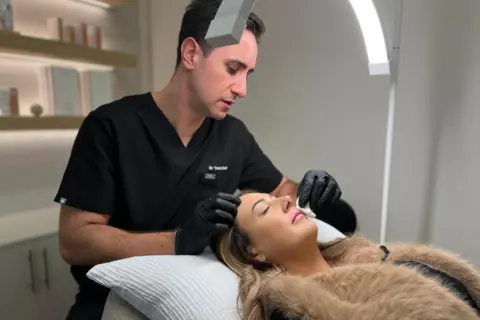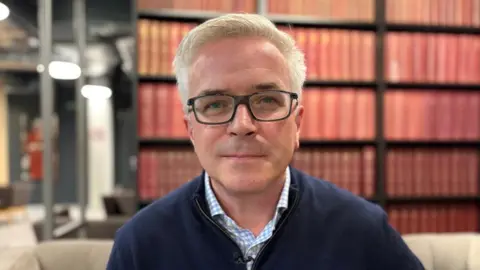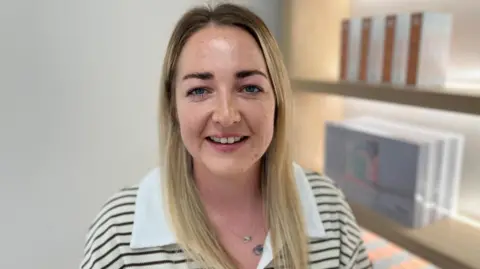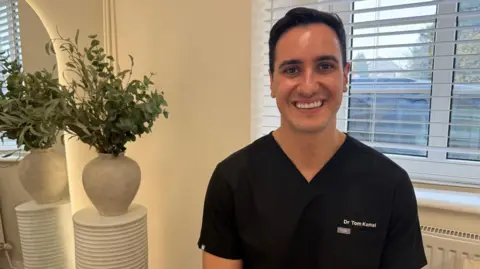Jenny ReesWales health correspondent
For Lizzie Day, having Botox was as much a part of her routine as getting her morning coffee.
It was only when a doctor friend raised concerns about a “fat-dissolving” treatment she was using that the 30-year-old took stock and started questioning what was going into her body.
Until this point, the recruitment consultant admitted she would just “jump on the bandwagon” of the latest aesthetic treatment to be discussed on social media.
Wales’ regulator Healthcare Inspectorate Wales (HIW) believes a comprehensive review is required into the type of services available, as well as into who provides them and where.
Its head Alun Jones said regulation has not kept up, creating “loopholes and anomalies”, while one GP likened the current situation to a “free-for-all”.
The Welsh government said Botox and weight-loss medicines can only be supplied with a prescription and a scoping exercise will be carried out early next year to see if further regulation is needed.
“I had no idea what was being injected into me,” Lizzie said.
“It’s just hype – it’s a trend, a bit like fashion – if everyone buys the same handbag it becomes popular and I’d say it’s the same for aesthetics.”

In England anyone prescribing treatments such as Botox or weight-loss injections Mounjaro and Ozempic must be registered with the Care Quality Commission (CQC).
However, in Wales only doctors are required to register with the Welsh equivalent, HIW.
This means other healthcare professionals are not legally required to meet the same standards or be routinely inspected.
Despite this, many do not question who carries out work, as Lizzie adds: “It’s just like going to get your coffee in the morning – popping in for a bit of Botox.”

Lizzie has lived in Manchester for the past decade, where she said treatments such as fillers, jaw-line enhancement and Botox are the norm for many.
It was only when a doctor friend back home in south Wales raised concerns about a “fat-dissolving” treatment she was using, that she took stock.
She now gets Botox treatment with a GP at a private clinic in the Vale of Glamorgan, where she will also have treatment declined if they don’t think it’s necessary – something she was not accustomed to elsewhere.
“I did beg him for Mounjaro,” she laughed.
“But he said ‘sorry, you don’t qualify’.
“But I know some people who will get told no by one person and will go anywhere to get it.”

HIW’s Alun Jones said a comprehensive review is required.
“If you’re a non-clinical individual providing Botox injections, it’s hard to see where the oversight comes from,” he added.
“The legislation that empowers us to act is quite out of date.”
He said carrying out certain procedures requires HIW registration, but only if provided from a fixed, physical location.
“So you could provide certain services on a mobile basis and you would no longer need to be registered with us,” Mr Jones added.
He said monitoring and inspections would drive up standards or spot bad practice, which in turn would keep the public safe.
“What the public might not know is the person giving them an injection has had minimal training and perhaps they’re not equipped to cope with a medical emergency should there be a reaction to that injection,” he said.

Hannah Jones, from Cardiff, started using Botox when she turned 30 last year.
But she kept returning for top-ups every fortnight because it wasn’t having the desired “freezing” effect.
It was only when she came across contradictory advice from another provider online that she started questioning what was being injected into her face, as doses had never been discussed.
She also learned she needed to wait 12 weeks between Botox injections, and prescribers of Botox had to see patients face-to-face, whereas she had only ever received injections from a third party, not the named prescriber of the medicine.
“That was a major red flag,” she said.
“I think it’s really important that people do their research before they have these treatments.”

These are issues the aesthetics industry itself has long campaigned to change, right across the UK, with a new bill drawn up earlier this year in Scotland.
Dr Tom Kamal is a GP registrar in Barry, but also runs his own private clinic in the Vale of Glamorgan, where he provides aesthetic treatments such as Botox, as well as weight-loss injections – which can have severe side effects if not properly administered.
He said he has treated many clients who had previously unnecessarily moved up through the doses of Mounjaro very quickly.
“Everyone seems to think that the higher the dose, the more rapid the weight loss is, but that’s actually not the case – it’s no wonder they experience side effects.”
He said under the right supervision the medicine “can make a massive difference” but the side effects can range from nausea, constipation and diarrhoea, to more sinister things such as pancreatitis and gallstones.
Dr Kamal described the situation in Wales as “a free-for-all”.

With the non-surgical aesthetics industry estimated to be valued at £3bn, Dr Kamal said the challenge for regulators is keeping up with the pace of change in a sector driven by social media trends.
“Saying no is one of the most important things that we do here in clinic,” he said, adding that it would be easy to capitalise on trends and provide unnecessary services for clients willing to pay.
It’s advice such as this that Lydia Cheetham from Penarth wishes she had been given eight years ago, when the trend was “big lips, big bum, big cheeks – it was everything bigger”, she said.
Lydia had her first lip fillers at 18, only to have them painfully dissolve a few years later.
“I wish I had never gone so crazy in the first place because I think I’m still living with the lasting effects around my mouth and I don’t know if that’ll ever go away fully,” she said.
“I wish someone had just said ‘look you do not need all this’.
“There needs to be much more regulation to stop people doing things just because it’s trending this year or your friends have done it.”
The Welsh government said: “Botox and weight-loss medicines can only be supplied with a prescription from an appropriately-qualified healthcare professional, who must act in accordance with the standards set by their respective professional regulatory bodies.
“Failure to meet those standards can lead to regulators to limit or suspend healthcare professionals’ practice.
“We recently introduced a mandatory licensing scheme for acupuncture, dry needling, body piercing, electrolysis, tattooing and semi-permanent makeup.
“We will undertake a Wales-specific scoping exercise early next year to ascertain whether further regulation is needed and will continue to engage with other governments across the UK on this issue.”
Source link : https://www.bbc.com/news/articles/c797vq95zzyo?at_medium=RSS&at_campaign=rss
Author :
Publish date : 2025-11-07 05:59:00
Copyright for syndicated content belongs to the linked Source.















